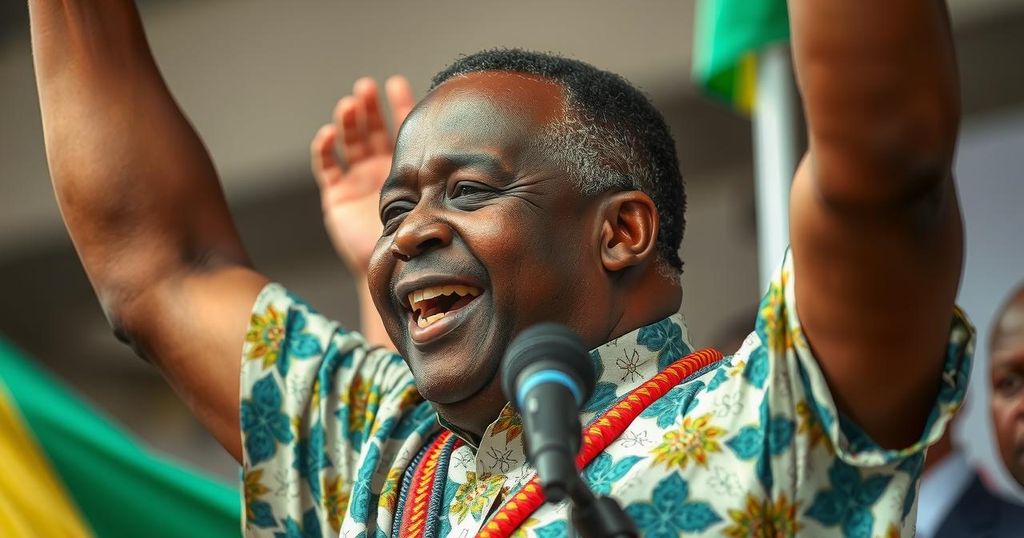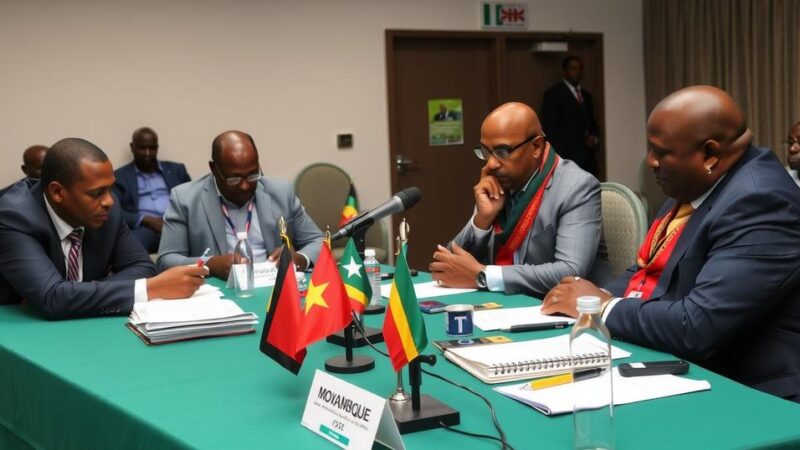Former President John Dramani Mahama of Ghana has won a historic comeback election, capitalizing on public dissatisfaction with the ruling NPP’s economic management. NPP Vice President Mahamudu Bawumia conceded defeat, signaling a desire for change amidst the country’s significant economic challenges. Mahama’s victory reflects the electorate’s call for new leadership as the NDC prepares to address pressing economic issues following a debilitating crisis.
Former Ghanaian President John Dramani Mahama has achieved a historic comeback by winning the presidential election held on Sunday. This electoral victory appears to stem from a public backlash against the ruling New Patriotic Party (NPP), which has faced significant criticism for its management of the economy amidst rising inflation and a debt default. Mahama’s success marks his third attempt at the presidency, following unsuccessful bids in 2016 and 2020.
NPP candidate and Vice President Mahamudu Bawumia publicly conceded defeat shortly after the election, acknowledging the electorate’s desire for change. Bawumia noted, “The people of Ghana have spoken, the people have voted for change at this time and we respect it with all humility.” He expressed to Mahama his congratulations through a phone call, recognizing the latter’s decisive victory. Supporters of Mahama jubilantly celebrated outside the National Democratic Congress (NDC) headquarters in Accra, signaling a significant shift in political sentiment.
The election was heavily influenced by Ghana’s economic challenges, including a recent $3 billion bailout from the International Monetary Fund (IMF) following a crisis characterized by high living costs and currency devaluation. NDC officials reported that preliminary internal assessments showed Mahama garnered 56.3 percent of the vote as opposed to Bawumia’s 41.3 percent. Although the official results from the election commission are pending, the NDC’s forecasting reflects a clear trend of discontent with the NPP’s economic policies.
Historically, Ghana has maintained a stable democratic environment, with regular transitions between the NPP and NDC since 1992. The NPP’s campaign under the slogan “Break the 8” aimed for an unprecedented third consecutive term but faltered amidst public dissatisfaction regarding former President Nana Akufo-Addo’s economic track record. Despite some improvements in macroeconomic indicators, the lingering issues of inflation and economic hardship proved pivotal in swaying the electorate toward Mahama’s leadership.
Although Mahama’s return was marked with celebration, he also faces scrutiny related to his previous administration’s economic struggles, notably the power shortages that plagued his time in office. The outcome of this election illustrates a profound desire for change amidst economic distress and reflects the electorate’s hope for a different approach to governance.
In conclusion, John Dramani Mahama’s victory signals a significant political shift in Ghana, resulting primarily from public dissatisfaction with the current administration’s economic management. Mahama’s commitment to addressing these economic challenges will be closely observed as he embarks on his new term, while the NPP reassesses its strategies in light of this electoral outcome.
Mahama’s emergence as president again poses the question of how he will reconcile past criticisms with the expectations of voters seeking improvement in Ghana’s economic landscape.
Lastly, as Ghana waits for the official results to be confirmed, the political landscape appears poised for transformation under Mahama’s renewed leadership.
The political environment in Ghana has historically been characterized by stability, with a two-party system dominated by the New Patriotic Party (NPP) and the National Democratic Congress (NDC) since the re-establishment of multiparty democracy in 1992. Both parties have alternated power, and the recent economic turmoil faced by the NPP had fueled public frustration. Issues such as high inflation and inadequate management of the economy played a crucial role in shaping voter sentiment towards Mahama’s campaign. Mahama’s prior experience as president from 2012 to 2017 adds to the narrative of his political comeback as he seeks to address the economic woes challenging the country.
John Dramani Mahama’s election victory represents a pivotal moment in Ghana’s political history, fueled by the electorate’s discontent with the NPP’s management of the economy. His leadership will be critical in navigating the challenges ahead and responding to the demands for economic reform following the widespread dissatisfaction that led to this electoral outcome. As official details emerge, it remains essential for Mahama to deliver on the promises made to a populace yearning for change.
Original Source: www.kten.com







